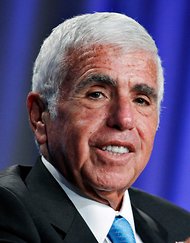 Danny Moloshok/Reuters In a regulatory filing it was revealed that Mel Karmazin, the former chief executive of Sirius XM, had resigned earlier than expected.
Danny Moloshok/Reuters In a regulatory filing it was revealed that Mel Karmazin, the former chief executive of Sirius XM, had resigned earlier than expected.
Digital Notes
Daily updates on the business of digital music.
Sirius XM Radio has appointed James E. Meyer as its interim chief executive officer, the company announced on Wednesday, as Mel Karmazin steps down from the top spot earlier than expected.
Mr. Meyer, who has been Sirius’s president of operations and sales since 2004, will serve as its chief while the company, which is in the midst of a takeover by Liberty Media, searches for a permanent replacement. Mr. Meyer, who will also join Sirius’s board, will receive a base salary of $1.3 million. He will also be eligible for bonuses if another chief executive is named before his contract runs out in October, the company said in a filing with the Securities and Exchange Commission.
Mr. Karmazin took over Sirius in 2004, and in October announced that he would leave on Feb. 1. But the filing said that on Tuesday he had resigned as chief executive and also left the board.
Liberty, which began the year with 40 percent ownership of Sirius, has spent much of the year buying up shares on the open market to take over the company. Liberty’s chief executive, Gregory B. Maffei, who is also on Sirius’s board, is leading a search committee, and has said that it was considering candidates from inside and outside the company.
Google and the Cloud Wars: Google has lobbed the latest volley over access to music collections through the cloud — a fancy name for the Internet, basically — by introducing a free scan and match feature on its Play service in the United States.
Last year, Amazon, Google and Apple rushed to introduce so-called cloud (or locker) systems, which let people store music files on distant servers for streaming or downloading to various devices. Apple was not the first but had the most advanced product with iTunes Match, which for $25 a year matches a user’s songs to those in a master database, thus bypassing the often cumbersome process of uploading each file. (To do that you need special licenses from music companies, which Google and Amazon at first did not have.)
Amazon added scan-and-match in July, and this fall Google caught up too, first in Europe and then yesterday in the United States. But Google’s version has one advantage: it is free. Apple still charges $25 a year, with a maximum of 25,000 songs; Amazon offers to back up 250 tracks free and then charges $25 a year for up to 250,000 songs (not counting ones bought on Amazon). Google’s limit is 20,000 tracks.
Whether the feature catches on with consumers is another question. Google Play, introduced only a year ago, has been slow to gain traction as a music store, and some commentators used Google’s announcement on Wednesday to voice their doubts about whether customers care about backing up song files when streaming music has become ubiquitous through services like Spotify and even Google’s YouTube.
Ben Sisario writes about the music industry. Follow @sisario on Twitter.
Article source: http://mediadecoder.blogs.nytimes.com/2012/12/19/karmazin-leaves-sirius-xm-earlier-than-expected/?partner=rss&emc=rss